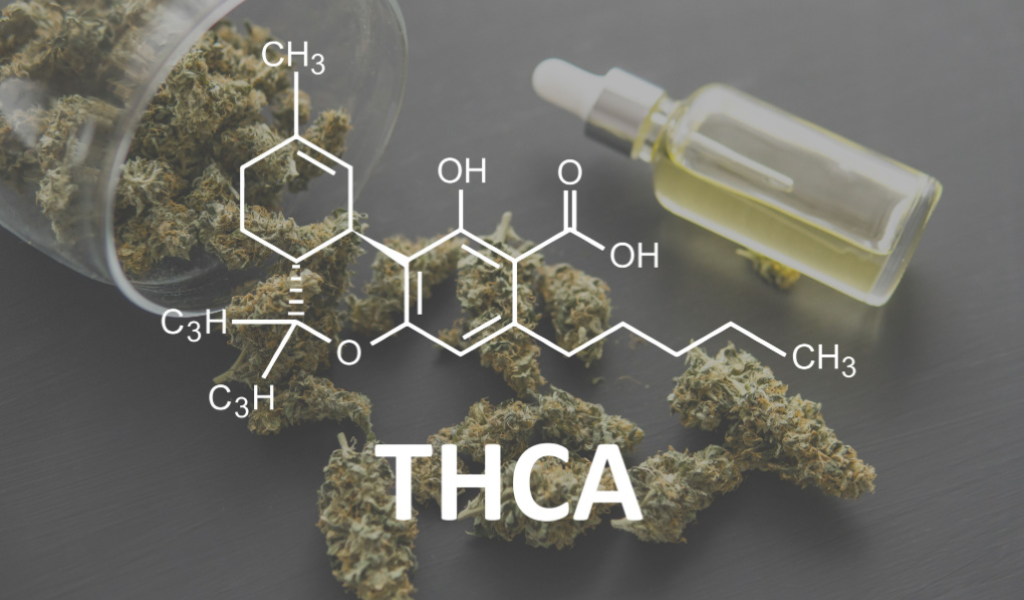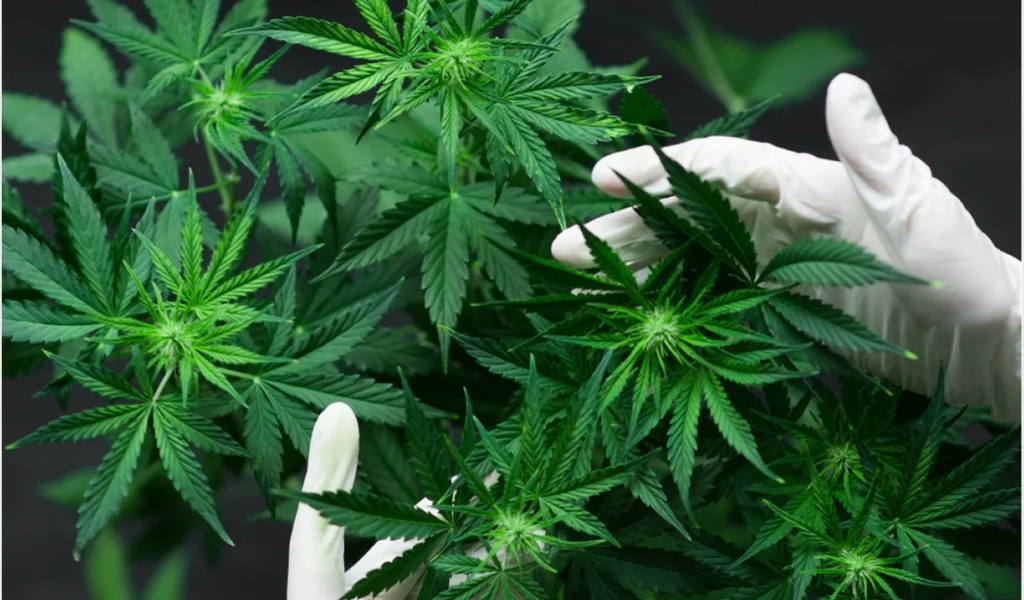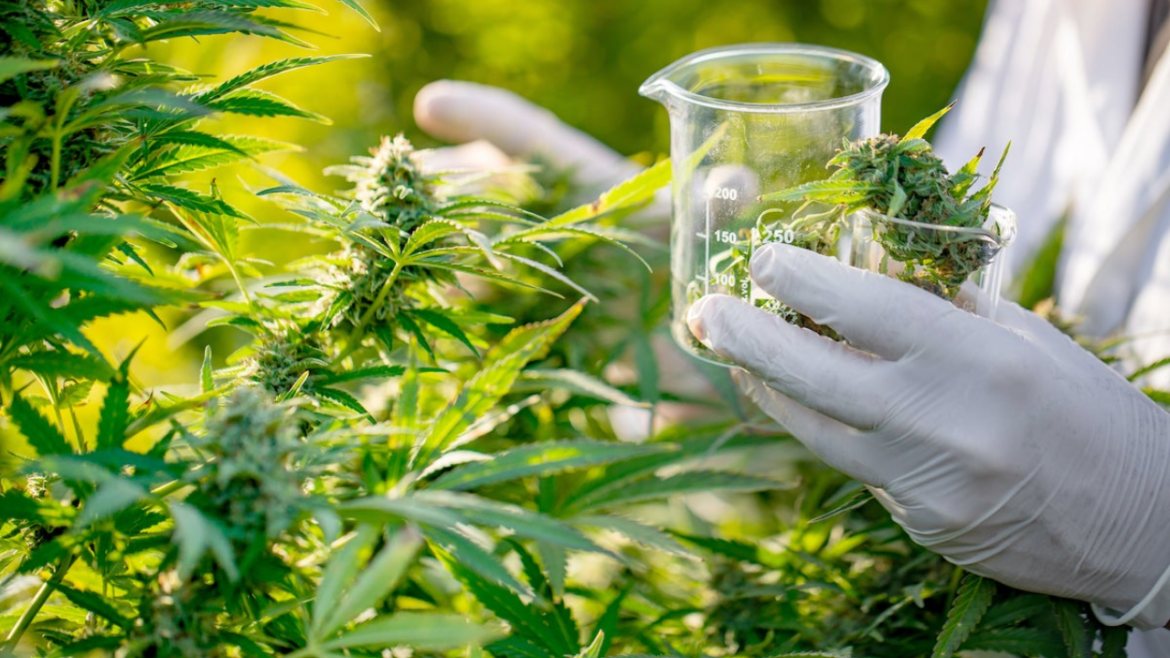Are you wondering about the possible THCA side effects? As a compound found in raw cannabis, THCA (tetrahydrocannabinolic acid) has gained attention for its health benefits but could come with some drawbacks.
This post will guide you through everything you need to know about the potential side effects of THCA, from common symptoms to comparisons with its derivative THC. Get ready for an informative journey that may help shape your path toward understanding and possibly utilizing this intriguing compound!
- THCA, or tetrahydrocannabinolic acid, is a compound found in raw cannabis plants and does not cause a “high” feeling like THC.
- Potential side effects of using THCA include dizziness, dry mouth (cottonmouth), fatigue, red eyes, rapid heartbeat, and paranoia/anxiety.
- THCA has potential health benefits such as pain relief, anti-inflammatory properties, and neuroprotective effects.
- It’s important to consult with healthcare professionals for proper dosing guidelines when using THCA.
What is THCA?

THCA, or tetrahydrocannabinolic acid, is a cannabinoid compound found in cannabis plants that has numerous potential health benefits.
Definition and Explanation
THCA stands for tetrahydrocannabinolic acid. It’s a part of the cannabis plant. Before heat is used, or when the plant is still fresh and not dry, you find THCA. This compound is not like THC, which gives users a ‘high’ feeling.
Think of THCA as the starting point for THC. After heat use in a process called decarboxylation, THCA turns into THC – the part that makes people feel high when they use marijuana.
But on its own, THCA does not cause this effect.
Sources of THCA
THCA is found mostly in raw cannabis plants. This includes the flowers, leaves, and stems. Many things can change how much THCA a plant has. The type of plant matters. How it was grown and where it came from also play a part.
Health Benefits of THCA

THCA offers pain relief, anti-inflammatory properties, and neuroprotective effects.
Pain Relief
THCA helps to stop the pain. It works well for things like sore joints or aching muscles. Some people with serious health problems also use it. For example, it can help if you have arthritis or seizures.
These are tough conditions that make your body hurt all over. But THCA eases this hurt and makes you feel better!
Anti-inflammatory Properties
THCA has been found to have anti-inflammatory properties, which means it can help reduce inflammation in the body. Inflammation is the body’s natural response to injury or infection, but chronic inflammation can lead to various health problems.
THCA works by inhibiting the production of inflammatory markers, thus reducing inflammation and helping alleviate associated symptoms like pain and swelling. This makes THCA a potential natural remedy for conditions such as arthritis, autoimmune diseases, and even certain skin conditions characterized by inflammation.
Additionally, THCA has been observed to have anti-hyperalgesic effects, meaning it can reduce sensitivity to pain. By targeting both inflammation and pain simultaneously, THCA may offer a unique approach to managing these common health concerns without the side effects often associated with pharmaceutical medications.
Neuroprotective Effects
THCA has been found to have neuroprotective effects, which means it can protect and support the health of our brain. Research suggests that THCA can help prevent memory loss and increase resilience to certain substances that could harm our brains.
It may also provide protection against chemotherapy side effects like nausea and vomiting. So, by consuming THCA, we may be able to take care of our brain and reduce the risk of certain neurological problems.
Potential THCA Side Effects
THCA may have potential side effects such as dizziness, dry mouth (cottonmouth), fatigue, red eyes, rapid heartbeat, and paranoia/anxiety.
Dizziness
Dizziness is a common side effect that can occur when smoking THCA flower, especially for people who are sensitive to THC. It can make you feel unsteady or lightheaded, and it’s important to be careful when using THCA if you experience dizziness.
Other potential side effects of using THCA include red eyes, dry mouth (also known as cottonmouth), and higher heart rates. So, if you decide to try THCA and start feeling dizzy, it may be best to stop using it and consult with a healthcare professional.
Dry Mouth (Cottonmouth)
Dry mouth, also known as cottonmouth, is a potential side effect when consuming THCA. It is common among cannabis users and can make your mouth feel like it’s full of cotton balls, making you feel dehydrated and thirsty.
To alleviate dry mouth, make sure to stay hydrated by drinking plenty of water. Using oral moisturizers or chewing sugar-free gum can also help. Be aware that consuming THCA in edible form can contribute to dry mouth too, so taking precautions beforehand may be helpful.
Fatigue
Fatigue is a possible side effect that some people may experience when smoking or consuming THCA. While there isn’t scientific evidence to support fatigue as a common side effect, anecdotal reports suggest that THCA may have different effects on different individuals.
Some people find it energizing, while others feel more tired after using it. It’s important to note that consuming THCA typically has few potential side effects overall, but it’s always wise to use caution and pay attention to how your body responds.
More research is needed to fully understand the effects and benefits of THCA on fatigue specifically.
Red Eyes
Consuming or using products containing THCA may cause red eyes. This is a common side effect associated with cannabis use in general, and THCA is no exception. The exact reason behind red eyes caused by THCA is not fully understood.
However, it’s important to note that red eyes are one of the potential side effects of THCA.
Rapid Heartbeat
THCA can cause a rapid heartbeat as one of its potential side effects. When using THCA, some people may experience an increase in heart rate, which can be concerning for those with pre-existing cardiac conditions.
This effect is similar to what happens when THC is consumed, as it also leads to an elevated heart rate. It’s important to note that increased frequency of marijuana use may increase the risk of cardiac arrhythmias and myocardial infarction.
Therefore, individuals should be cautious when using THCA and consider consulting with healthcare professionals if they have any concerns about their heart health.
Paranoia/Anxiety
THCA, a compound found in cannabis, can potentially cause side effects like paranoia and anxiety. When we consume THCA, it can affect our brain and overstimulate the amygdala, which is responsible for fear and anxiety.
This can lead to feelings of paranoia and intense worry. Additionally, THC, a derivative of THCA, is known to cause dysphoria and hallucinations that may also be associated with THCA use.
Negative side effects related to anxiety and paranoia have been linked to THC and may apply to THCA as well. It’s important to note that THC has a higher likelihood of causing anxiety compared to CBD, another cannabinoid.
Comparing THCA and THC
THCA and THC differ in potency and side effects. To learn more about these differences, continue reading.
Differences in Potency
THCA and THC have different levels of potency. THC is the psychoactive compound in cannabis that gives you a “high” feeling, while THCA does not produce this effect. THC is known for its strong potency and can have more intense intoxicating effects compared to THCA.
On the other hand, THCA has its own potential health benefits without the psychoactive properties associated with THC. So, if you’re looking to avoid getting high but still want to explore the medicinal aspects of cannabis, THCA might be a safer option for you.
Differences in Side Effects
THCA and THC may have some differences when it comes to side effects. THCA does not have psychoactive effects, so it doesn’t cause the “high” feeling that THC does. However, consuming higher amounts of both THCA and THC can increase the likelihood of experiencing adverse effects.
Some common mild side effects of both substances include dizziness, dry mouth (cottonmouth), fatigue, red eyes, rapid heartbeat, and paranoia/anxiety. It’s important to note that individuals who are sensitive to THC may experience similar side effects when consuming THCA.
Heating THCA converts it to THC, which can counteract some negative side effects associated with ingesting THCA.
Safety of THCA
THCA has a lack of notable side effects, but it is important to be aware of the potential conversion to THC. To learn more about the safety and benefits of THCA, keep reading.
Lack of Notable Side Effects
Consuming THCA does not typically result in any notable side effects. Most people who use it experience little to no adverse reactions. This is good news for those seeking the potential benefits of THCA without worrying about uncomfortable or dangerous side effects.
However, it’s important to note that the legal status of THCA may vary depending on where you live, so be sure to check local laws before using it. Additionally, further research is still needed to fully understand both the possible side effects and benefits of THCA.
Potential Conversion to THC
THCA, which is found in raw cannabis plants, has the potential to convert into THC. When consumed orally or when stored over time, THCA can change into THC in the digestive tract. This conversion process is important because THC is known to have psychoactive effects and may cause negative side effects such as anxiety or paranoia.
Therefore, it’s crucial to consider the potential conversion of THCA to THC when discussing its safety and possible side effects.
THCA and Decarboxylation
Decarboxylation is the process that converts THCA into THC, which has psychoactive effects and additional therapeutic benefits. Explore the significance of decarboxylation and its impact on THCA in this section.
Explanation of Decarboxylation Process
Decarboxylation is the process of converting THCA into THC, which is responsible for the psychoactive effects of cannabis. Heat plays a crucial role in this process. When cannabis is heated, such as through smoking, vaporizing, or baking, the THCA molecules lose a carboxyl group and become THC.
This activation allows the THC to bind with receptors in our body and produce effects like euphoria, relaxation, altered perception, and increased appetite. Proper decarboxylation is necessary when consuming cannabis in different forms like edibles or tinctures to ensure that we experience the desired effects.
Effects of Decarboxylated THCA (THC)
Decarboxylated THCA, or THC, is the compound in cannabis that has psychoactive effects. When THCA is heated through a process called decarboxylation, it transforms into THC. This conversion is what gives cannabis its mind-altering properties.
The effects of THC can vary from person to person but commonly include feelings of euphoria, relaxation, altered perception of time, increased appetite (also known as “the munchies”), and potential impairment in memory and coordination.
It’s important to note that THC carries some risks such as potential addiction and negative impacts on mental health for certain individuals. Therefore, it’s crucial to use THC responsibly and be aware of the potential side effects it may have on your body and mind.
Dosage and Recommendations
Proper dosing guidelines should be followed when using THCA, and it is recommended to consult with healthcare professionals for personalized advice. Read on to learn more about the safe and effective use of THCA.
Proper Dosing Guidelines
To ensure the safe and effective use of THCA, it is important to follow proper dosing guidelines. Here are some key points to keep in mind:
- Start with a low dose: Begin with the lowest possible dose and gradually increase if needed. This allows you to gauge your body’s response and minimize the risk of side effects.
- Consult with a healthcare professional: It is always recommended to seek guidance from a healthcare professional who is knowledgeable about cannabis and cannabinoids. They can provide personalized advice based on your specific needs and medical history.
- Consider individual tolerance: Each person may have a different sensitivity to THCA. Factors such as age, weight, metabolism, and overall health can influence how your body reacts to the compound. Take this into account when determining your dosage.
- Be aware of potency: THCA dosage should be 10 to 100 times lower than THC dosage. Keep this in mind when calculating the amount of THCA you consume.
- Understand product labeling: Pay attention to product labels that provide information about the concentration of THCA per serving or per unit of measurement (such as milligrams). This can help you accurately measure your dosage.
- Monitor for side effects: While THCA generally has fewer side effects compared to THC, it’s still important to be mindful of any adverse reactions. If you experience any discomfort or unwanted effects, reduce or adjust your dosage accordingly.
Consultation With Healthcare Professionals
It is important to talk to healthcare professionals when considering the dosage and recommendations for THCA or any other cannabinoids. They have the knowledge and expertise to guide you in using these substances safely.
Pharmacists at medical cannabis dispensaries can also provide valuable guidance on how to increase your dosage and manage any potential side effects that may arise. If you experience any side effects while using medical cannabis, it is crucial to discuss them with your healthcare professional, as they can provide appropriate advice and support.
By consulting with healthcare professionals, you can ensure that you are using THCA or other cannabinoids in a way that is safe and beneficial for your individual needs.
Additional Benefits and Uses of THCA
THCA shows potential in cancer treatment and has a range of other medicinal applications. Read on to learn more about its benefits and uses.
Potential Use in Cancer Treatment
THCA shows promise in the treatment of cancer, particularly pancreatic cancer. Two derivatives of THCA, known as ALAM027 and ALAM108, are being studied for their potential in fighting this type of cancer.
Not only does THCA display anti-cancer properties, but it may also help slow down the growth of cancer cells. This means that THCA could be a valuable addition to traditional cancer treatments.
Furthermore, researchers believe that THCA holds additional benefits beyond its ability to combat cancer cells. Its anti-tumor effects make it an exciting area of exploration for potential therapeutic applications in treating various types of cancers.
Other Medicinal Applications
THCA has shown potential for use in cancer treatment, as it may slow down the growth of cancer cells. It also has other medicinal applications beyond pain relief and anti-inflammatory properties.
For example, THCA can stimulate the appetite, making it beneficial for individuals with reduced appetite or eating disorders. Additionally, it can help reduce nausea, which is helpful for those undergoing chemotherapy or experiencing motion sickness.
These additional uses highlight the versatility and potential benefits of THCA in various medical contexts.
Frequently Asked Questions (FAQs)
Now let’s explore some common questions on this topic.
1. What are the side effects of THCA?
The side effects of THCA are not well-documented, but some people may experience drowsiness, dry mouth, or changes in appetite.
2. Is THCA safe to consume?
THCA is considered safe for most people when consumed in moderation. However, it’s important to consult with a healthcare professional if you have any underlying medical conditions or are taking medications.
3. Can THCA cause a “high” like THC?
No, THCA does not produce psychoactive effects and does not cause a “high” like THC.
4. Are there any potential interactions between THCA and medications?
Due to limited research on THCA, potential interactions with medications are currently unknown. It’s best to consult with your healthcare provider before combining THCA with any prescription or over-the-counter drugs.
Wrapping Up
In conclusion, THCA has both benefits and potential side effects. While it may offer pain relief and anti-inflammatory properties, it can also cause dizziness, dry mouth, fatigue, red eyes, rapid heartbeat, and paranoia/anxiety.
It’s important to be aware of these potential side effects when using THCA. Remember to consult with healthcare professionals for proper dosing guidelines and to ensure your safety when using THCA or any cannabis-related products.

